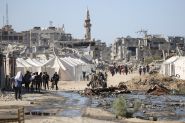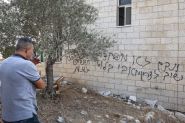- Home
- Middle East
- New Exchange Expected On Saturday Between Israeli Hostages In Gaza And Palestinian Detainees

©Jack Guez / AFP
On Saturday, Hamas is due to free four Israeli soldiers, held hostage in Gaza since 7 October 2023, in exchange for several dozen Palestinians detained in Israel, in the second exchange of this type under the truce agreement in the Gaza Strip.
Nearly a week after the ceasefire came into force, which was generally respected, the Palestinian Islamist movement published on Friday the names of the four young women, aged between 19 and 20, whose release is expected later today.
The office of the Israeli Prime Minister, Benjamin Netanyahu, confirmed that it had received the list from the mediators.
The Hostage Families Forum, which has been waiting for all the hostages to be informed, issued a statement welcoming ‘the expected release of Daniella Gilboa, Karina Ariev, Liri Albag and Naama Levy after 477 days in captivity’.
They were doing their military service, assigned to guard the Gaza Strip when they were abducted on 7 October 2023 during the attack by Hamas commandos on the south of the country.
The number of Palestinian detainees to be released in exchange, in accordance with the current ceasefire agreement in Gaza, has not been revealed. The Israeli Prison Service said that some would be returned to the Gaza Strip, others to the occupied West Bank.
‘The al-Qassam Brigades and other groups (...) will free the four prisoners on Saturday’ and hand them over to the International Committee of the Red Cross (ICRC), a source close to Hamas told AFP on condition of anonymity.
According to Palestinian sources, these releases could take place in the morning.
They are part of the truce that came into force on Sunday after more than 15 months of war, the first phase of which is due to last six weeks.
This first phase is supposed to lead to the release of 33 hostages in exchange for some 1,900 Palestinian prisoners.
Three young Israeli hostages in Gaza had already been released on 19 January, in exchange for the release of 90 Palestinians, mostly women and minors. After this exchange, 26 Israeli hostages will remain to be released during the first phase of the agreement.
All the names have been released, but in no chronological order of release, leaving the hostages' families in unbearable doubt.
The Hamas attack on 7 October 2023 resulted in the deaths of 1,210 people on the Israeli side, most of them civilians, according to an AFP count based on official data. Of the 251 people abducted at the time, 91 are still in Gaza, 34 of them dead according to the army.
Others were announced dead by Hamas but without Israeli confirmation.
‘Bring back all the hostages, alive and those who have unfortunately died’, urged Zahiro Shahar Mor, insisting that they all be freed as soon as the first phase is completed, at a new demonstration in support of the hostages on Friday evening in Tel Aviv.
‘This is our last chance’, added this relative of a hostage, at a time when many fear that Mr Netanyahu's government will resume hostilities in Gaza as soon as the first phase is over.
In retaliation for 7 October, Israel launched an offensive in the besieged Gaza Strip that left at least 47,283 people dead, most of them civilians, according to data from the Hamas Ministry of Health. The operation has caused a humanitarian disaster.
The truce, in a devastated territory, has generally been respected since Sunday, apart from a few incidents.
But while displaced Gazans are anxious to return home, many have found nothing but rubble. ‘We have nowhere to pitch our tents because of the destruction,’ Theqra Qasem, a displaced woman, told AFP.
However, in less than a week, the truce has allowed several thousand lorries of humanitarian aid to enter the small territory.
On Friday, Israel also warned the UN agency for Palestinian refugees (Unrwa), accused of being infiltrated by Hamas, to cease its operations in Jerusalem.
This warning, issued via a letter from the Israeli ambassador to the UN, follows a series of laws aimed at the agency that have raised fears for the future of its activities (health and education) in Gaza and the West Bank.
The head of Unrwa, Philippe Lazzarini, deplored the Israeli decision on X, saying it risked ‘sabotaging the ceasefire in Gaza, once again dashing the hopes of those who have gone through untold suffering’.
With AFP.
Read more



Comments